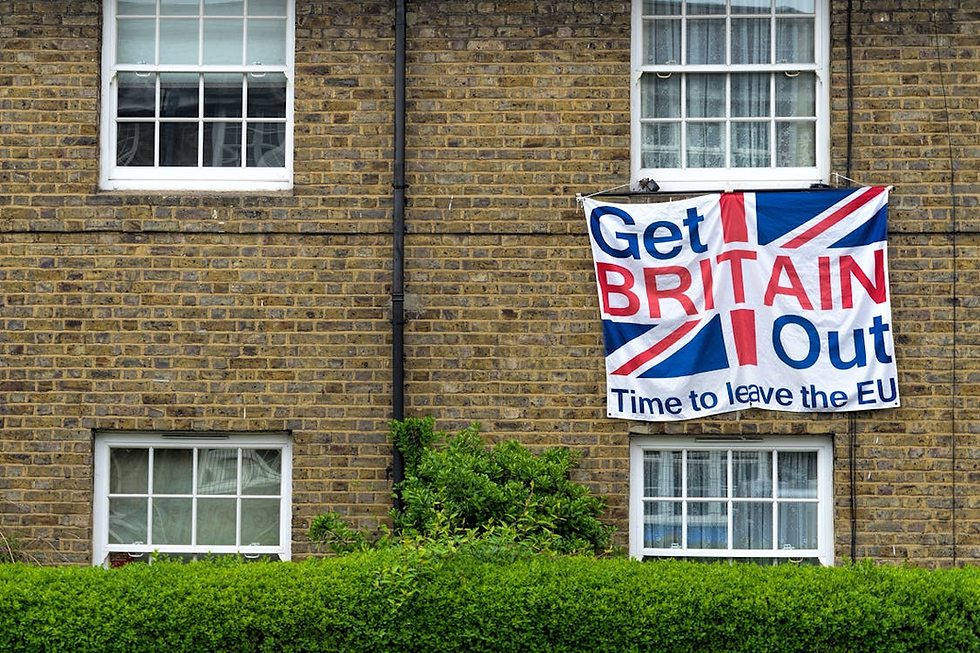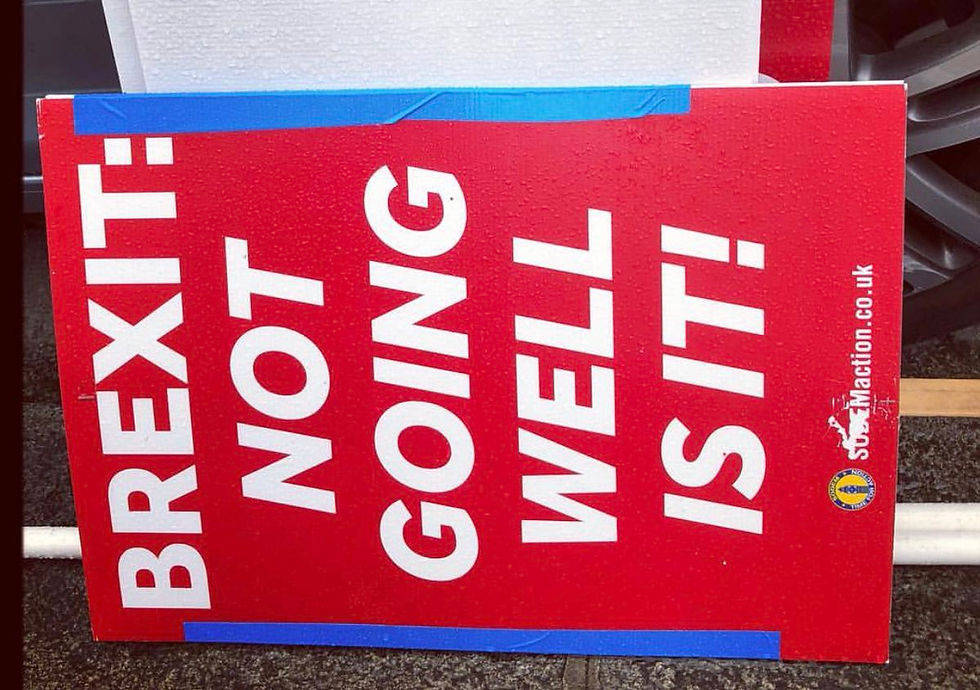Brexit: A Commercial Wolf in Sheep’s Clothing
- Zac Cash

- Feb 12, 2021
- 5 min read
Updated: Dec 23, 2024
An Op-Ed
The main case for the ‘Leave’ campaign during the referendum in 2016 was that Brexit was going to be a new dawn. That a resurging sense of autonomy and optimism would be placed upon the British people; that finally, we would ‘have our country back’ and the rules and boundaries that came with being a member state of the European Union (EU) would finally be rescinded. The shackles that came with EU trade regulations would be lifted off, allowing both commercial and economic innovation to flow freely and diversely.

Five years on, and with a Brexit deal finally arranged and in place, the reality of Britain’s departure from the EU could not have been further from the image of freedom that was fabricated by the likes of Nigel Farage, Boris Johnson, and other prominent Eurosceptics that seemed so vocal during 2016 and beyond. Disregarding the evident social and political turmoil that Brexit has cast our country into - the dismissal of two Prime Ministers, the age it took to reach a deal, and the opinionated divisions that, before Coronavirus, generated the most widespread discussion throughout the nation - it is abundantly clear that, now that a deal has been reached and put into circulation, a perhaps even greater issue is wreaking havoc.
The most amount of critical noise in the early days of Johnson’s deal coming into play was from the British fishing crews, who found themselves unable to sell their produce in EU-member markets because of restrictions and overwhelming delays at ports. Then, outrage came from musicians whose tours had already been dealt a hard blow by the ramifications of COVID-19, as EU visa restrictions meant that it would now be harder to book venues and play in certain European countries. However, as almost a month and a half has progressed since Britain’s official exit from athe EU, the main effects regarding livelihood have been felt by the small and moderately sized businesses whose survival within the market depends on international trade. It is clear that the implications of the Brexit deal have been nothing short of disastrous for these businesses and their owners.
A perfect example of this miscommunication between the government and such businesses is the fate of Andrew Moss. He manages a company based in Ely, which sells packaging and other marketing exports to other countries in Europe, and believes that his company makes up one of the many small businesses across the UK that provide the backbone for the country’s economy. Since the 31st of December 2020, the official date of Brexit, Moss has experienced many problems, such as a major increase in the amount of form-filling and Brexit-related charges that will eat into his profits, simply because his main focus of work is with countries that still belong to the EU.
Like many other companies, Moss has had to face one particular challenge that, at one point, made him consider shutting down his company for good. Before Britain exited the EU, small businesses did not charge VAT to customers in other EU countries. However, EU rules now dictate that, since Britain is now an outsider to the Union, VAT charges must be paid before the goods are shipped over. Outraged at the prospect of paying an additional fee, on top of shipping charges, and the increased waiting time due to the goods coming over from a foreign country, customers of Moss’ business began to refuse. After debating what to do, Moss eventually settled on a two-part strategy. Thinking short-term, he decided that he would pay his customers’ VAT charges. But, reasoning that this strategy would not be economically sustainable in the long term, he decided that he would establish a stem-off company in the Netherlands. This branch in the Netherlands then would eventually begin to process the orders from customers in EU countries, thus solving the VAT problem. Yet, the fact that Moss has had to go through this laborious (and avoidable) task highlights the inaccuracy in Brexiteers’ promises before, during, and after the withdrawal.
Other owners of such companies have turned to equally drastic measures to combat the sudden challenges they face. Gyr King is the head of a company that sells framed fine art prints to both the public and big museums abroad. The company has decided to completely cease sales to EU countries because of shipping delays, VAT problems, and other seemingly endless charges. The reason for this is the same reason that Moss has had to set up his Netherlands branch: “A significant amount of what we sell at the moment will not be possible to ship because the customers will not pay for these extra costs." On top of this, there is another problem. King remarks that “we are hit both ways”, as there are not enough materials coming from the EU to the UK as there are significant delays and other charges on their end. UK businesses who are importing materials and products from the EU have reportedly also had to pay VAT, on top of import rates.
Finally, the situation is even worse for companies in Ireland. The DUP MP Ian Paisley said to the Northern Ireland secretary, Brandon Lewis, at a press conference that the first 20 days of Brexit for Northern Ireland had been an “unmitigated disaster”. He reportedly knew of companies that were losing “up to £1000” per week because of delays at ports. The very same Brandon Lewis announced that, on the 1st of January 2021, there would be no new Irish border checks and that goods would keep "flowing freely around the country, including between GB and NI." Evidently, that is not the case.
Of course, this is just the cherry on top of the catastrophe that is Brexit. Many others, from various spheres of society, have voiced their anger and frustration at a transition that was promised not only to be seamless and relatively quick, but one that would make Britain’s role in Europe easier and more charmonious, even without the safety net of being an EU member. Musicians in particular, due to the added complications of touring thanks to mandatory visa applications, have openly criticised the promises that ardent Brexiteers made throughout the process.

Ministers claim that this is simply a ‘teething’ problem, that once the clamour and chaos of a post-Brexit UK calm down, order will be restored and businesses will thrive once again. However, as Andrew Rawnsley sums up nicely, "a lot of these problems are not temporary rites of passage into a brave new world – these are permanent liabilities." It is only when both politicians and businesses both accept that these (self-imposed) predicaments will endure, that we will see a potential change in the way business is conducted through this messy political divorce.

_edited.png)



Comments